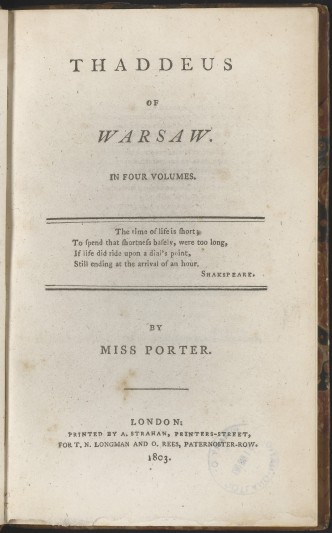Graham Hogg, Curator for 19th-Century Printed Collections and Photographs, writes: This four-volume set is an important first edition by an influential author who is usually considered to be Scottish. The author, Jane Porter (1775?-1850) moved when she was three or four with her widowed mother and sisters to Edinburgh, where she stayed until 1785. According to the Oxford Dictionary of National Biography ‘An old woman, Luckie Forbes, told them stories of ancient heroes, especially William Wallace. Their mother was acquainted with Walter Scott's mother, and he is said to have played with the girls when he was a boy (Scott, however, makes no reference to the family in his letters or journals).’ Porter maintained a strong attachment to Scotland for the rest of her life.
Set during the Second Partition of Poland in the 1790s, Thaddeus of Warsaw is one of the earliest examples in English of the historical novel, introducing the new stock figure of the noble exile. Despite being commercially published, this work did not have a large initial print run. It did, however, become enormously popular and successive editions were rapidly produced. Porter is now best known now for her second major novel, The Scottish Chiefs, based on William Wallace and Robert Bruce.
The women, like Porter, who preceded Walter Scott as authors of historical fiction are increasingly popular subjects of research interest and are being reclaimed by a wider audience. Thaddeus of Warsaw received its first scholarly edition in 2019, after having been out of print for more than a century, and other works of Jane Porter have recently received modern editions. This title is of especial interest as it connects Jane Porter and early Scottish historical fiction to Poland, and because of our own Polish collection, which was originally presented to the Signet Library in Edinburgh by two Polish political exiles. This collection contains material reflecting the same period of Polish history as is covered by the novel.
Only two copies of this edition are recorded elsewhere in the UK: at the University of Birmingham and with the National Trust. WorldCat identifies one copy in the USA and one in Poland. There are also known copies in the Corvey collection in Germany and the Huntington Library in California. It is therefore by any standard a rare book. No copy of the first edition has been recorded at auction since 1975. Housed in a custom blue quarter-calf solander case, all four volumes of this copy have the armorial bookplate of Edward Southwell Trafford (1838-1912), a Norfolk landowner and judge.
Bought from Peter Harrington Rare Books.
